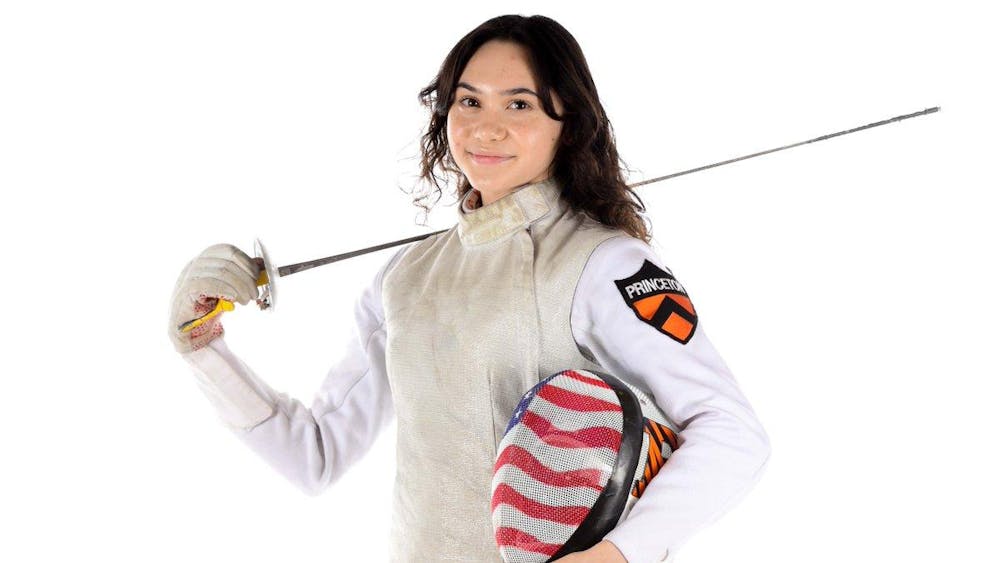On a busy Thursday afternoon in Paris, the Tigers smelled gold in the women’s foil competition taking place at The Grand Palais. Team USA, with junior Maia Weintraub on the roster, cruised through their three bracket matches to take the top prize. In turn, they became the first ever American team, male or female, to claim gold in the team-based competition, with Weintraub claiming another gold medal for the Orange and Black.
“Once that final touch was made, it was just pure emotion. It was unbelievable to all of us, so many tears were shed, but happy tears,” Weintraub told The Daily Princetonian. “It just felt like all of our efforts and hard work culminated in this, and it was crazy to realize this was over.”
Fencing consists of three different blades — saber, epeé, and foil — and in the Paris Olympics, there are men’s and women’s individual and team events for all three blades. Weintraub and the gold medal-winning team competed in the team foil event.
The foil competition scores differently from the other blades — to score a point, you can only strike the torso of your opponent. This means unlike with the épée or sabre competitions, touches on the head, arms, or legs do not count.
The American team consisted of Lee Kiefer, Harvard’s Lauren Scruggs, Columbia alumna Jacqueline Dubrovich, and Weintraub. Kiefer and Scruggs had already competed against each other in the women’s individual foil competition, claiming gold and silver respectively, setting up American hopes for a strong team competition.
Each team match consists of nine bouts, where teams of three fencers and a substitute play each member of the opposing team once. The bout ends when either three minutes run out or when the winning team reaches the maximum allowed score for the respective round.
Weintraub did not feature in the first-round matchup. Kiefer, Scruggs, and Dubrovich won a close match against China, winning 45–37 after taking a small lead to start and slowly growing it.
“The uncertainty of my role was expected, and I think that made it even more challenging,” Weintraub said to the ‘Prince’ about her position within the team. “I had to be prepared for all situations.”

Team USA, seeded second, faced Canada in the semifinals. Canada defeated France 38–36 in the first round, while fellow Princeton sophomore Sabrina Fang did not play. While neither Weintraub nor Fang played in the semifinal matchup, Team USA defeated Team Canada 45–31, advancing to a final against top overall seed Italy.
“There was obviously a danger of being too excited almost, especially after winning a semifinal and realizing we had secured a medal,” Weintraub said to the ‘Prince.’ “We were ecstatic, but we had to reign in our emotions and get ready to focus for the finals in order to try and bring home the gold.”
Stepping up when she was needed the most, Weintraub substituted in for Jacqueline Dubrovich early in the gold medal match. Weintraub played twice more down the stretch, outscoring those two opponents by a combined 11–5 in an extraordinary performance.
Facing Arianna Errigo in her first match, Weintraub went down 3–0 before tying it at 3–3 and then 4–4 in a close matchup. She came back, however, to beat Errigo 6–4 reaching the maximum team score of 25 for the round and ending their bout, securing vital points for the team.

“I think in the beginning, I was almost trying to be too perfect with my fencing; being out there the lights are so much brighter,” Weintraub said to the ‘Prince.’ “I realized I should be free, be creative, and just have fun while I’m on the greatest trip in fencing.”
For her second and final bout, she faced Francesca Palumbo, the Italian team’s substitute, and quickly dispatched her, based on team points, with 1:09 remaining in their three minute matchup.
Weintraub went up 2–1 before a point for her opponent was overturned, and within the next 30 seconds, she managed to secure three more hits to end the bout at 5–1. With her victory, she brought the USA team lead up to 35–26.
“Seeing how my teammates were very supportive, always cheering for each other, gave me the confidence boost I needed for the match,” Weintraub expressed to the ‘Prince.’
Weintraub’s contributions were essential. Heading into the final bout up 40–32, Scruggs crossed the finish line for Team USA, leading them to a 45–39 win, exactly Weintraub’s margin of victory in her two full bouts post-substitution, showing that the Princeton Tiger was the difference for Team USA.
For Team USA, it is a historic victory — their first ever gold in the event and only team gold medal in fencing this Olympics.
Weintraub, with both an Ivy League and NCAA foil title already under her belt, now adds an Olympic gold medal to her resume.
“First business is to go back to school,” Weintraub told the ‘Prince.’ “I’m definitely going to continue fencing, and I’m trying to go for 2028 [Olympics], but I think next year, I want to have more time for myself and my school life.”
“I took a gap year this past year for fencing, and I want to get back and focus on my academics, being there with my friends, and things I can only do for two more years,” Weintraub continued.
The Los Angeles 2028 Olympics are far away for now, but in the meantime, Weintraub has two more years to fence for Princeton and come back to reclaim her Ivy League and NCAA titles. Regardless of her future, however, Olympic champion is a title she can never lose.
Max Hines is a senior Sports writer for the ‘Prince.’
Alex Beverton-Smith is an assistant Sports editor for the ‘Prince.’
Please send any corrections to corrections[at]dailyprincetonian.com.








